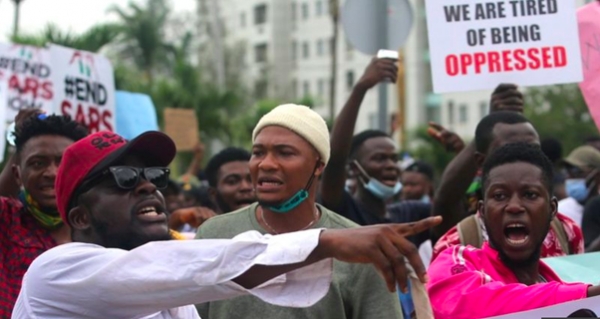In recent weeks, a protest movement has been gaining traction in Nigeria, as the country continues to battle with persistent violence and over-policing by its security forces. The movement known as #EndSARS, refers to the Special Anti-Robbery Squad, a unit of the Nigerian Police with a long history of abuse against civilians.
Since independence in 1960, Nigeria has been plagued by civil war, military dictatorships, and volatile democracy. In 1999, the country achieved stable democracy and in the past two decades has become a giant of the African continent, both through population growth and its booming economy. However, it has continued to struggle with improving its human rights record. According to the U.S Department of State, abuses by security forces, arbitrary detentions, corruption, civil violence, and poverty remain as some of Nigeria’s most significant human rights challenges.
#EndSARS first emerged on Twitter in 2017, but the movement was revitalised in October 2020 as further revelations of police brutality and corruption came to light. Protests erupted across Nigeria, as the country “was already at boiling point [due to] years of unchecked violence, including alleged killings, rape, extortion and other violations, by the Special Anti-Robbery Squad” (OHCHR). Despite SARS officially being disbanded on 11 October 2020 and the announcement of Federal and State level inquiries, protests have continued and thus so has the violent repression.
The #EndSARS hashtag has seen a social media spotlight placed on Nigeria, a spotlight which has now gained the attention of the mainstream media globally. Despite the world’s gaze now being fixed on Nigeria, the security forces response to protestors has been particularly violent. In an extreme escalation of violence on 20 October, Nigerian Security forces opened fire on protestors in the capital Lagos. UN Secretary General António Guterres condemned “the violent escalation” against protestors in Lagos which “resulted in multiple deaths and caused many injuries.”
UN Human Rights Chief, Michelle Bachelet also released a statement condemning the “immediate creation of another elite police SWAT team to replace the SARS - without first addressing some of the root causes of police violence and putting in place sufficient safeguards to prevent future violations - has eroded the public’s trust even further”. She added that the response of security forces has “wantonly added fuel to a fire that was already starting to rage out of control.”
In her statement, Ms Bachelet called on Nigerian authorities to address the underlying problem of “persistent violations committed by security forces, and make a far stronger effort to bring police and army personnel guilty of crimes against civilians to justice.”
Ms Bachelet called for a “root and branch” re-examination of the country’s security forces. Nigeria must take concrete steps to investigate SARS and the security forces independently and transparently. Although the government has stated that there will be inquiries at the State and Federal levels, where sufficient evidence is found to warrant charges, Ms Bachelet has called for immediate suspension of officers suspected of committing serious crimes.
The government must demonstrate a clear commitment and responsibility to protecting its civilians and improving its human rights records. With such a young population, and the ever-increasing use of social media, it is vital that the grievances of the younger generation be heard and acted on. While police brutality is one of a multitude issues faced by Nigeria, the world is now watching to see if one of Africa’s leaders will listen to its citizens or continue to protect its armed forces.
To read more, please visit:
https://www.ohchr.org/EN/NewsEvents/Pages/DisplayNews.aspx?NewsID=26405&LangID=E
https://news.un.org/en/story/2020/10/1075842
https://www.bbc.com/news/av/world-africa-54559566







